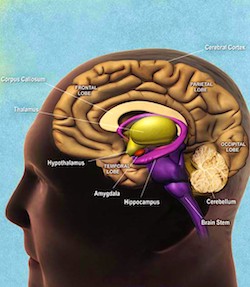A new MRI study demonstrates that acupuncture controls and reduces functional diarrhea and has mapped the brain centers involved in the clinical successes.  A group of functional diarrhea (FD) patients were compared with a control group.
A group of functional diarrhea (FD) patients were compared with a control group.
MRI investigation revealed that acupuncture consistently affected specific brain centers in the FD group. The researchers concluded that “acupuncture alleviated defecation frequency and improved stool formation in FD patients.” The MRI results showed that the FD clinical improvements are associated with a homeostatic regulation of the afferent processing network by the application of acupuncture.
FD is a gastrointestinal disorder involving chronic diarrhea absent structural or biochemical abnormalities. The researchers note the Traditional Chinese Medicine (TCM), including acupuncture, has been used for centuries for the treatment of gastrointestinal disorders. The researchers chose an acupuncture point for the study based on TCM theory and clinical histories.
Acupuncture point ST25 (Tianshu) was referred to in the study as “an important acupoint in the stomach meridian of the Foot Yangming, (that) is commonly used to treat intestinal illnesses, such as constipation, diarrhea, abdominal pain and bloating.” According to TCM theory, ST25 is the front Mu (Alarm) point of the large intestine, regulates the function of the intestines, regulates Qi and eliminates stagnation. ST25 is located 2 cun lateral to the center of the umbilicus.
Patients received a total of 10 acupuncture treatments each, at a rate of 5 treatments per week for 2 weeks. ST25 was needled bilaterally with a 40-50mm X 0.3mm needle that was inserted to a depth of 30-40mm. A gentle manual manipulation technique of lifting, thrusting, twisting and rotating was applied to achieve deqi. Needle retention time was 30 minutes per acupuncture treatment and needles were manipulated every 10 minutes for a duration of 10-15 seconds to maintain the deqi sensations. All treatments were performed by a licensed acupuncturist.
A 3-T Siemens magnetic resonance scanner was used to perform the fMRI analysis of brain activity. Analysis was performed using a data driven ReHo (Regional Homogeneity) method measuring blood oxygen level dependent brain signals. An increase in ReHo in the left ACC (anterior cingulate cortex) following acupuncture treatment was correlated with a decrease in defecation frequency. MRI imaging revealed that acupuncture changed modulation of the sensory, cognition and motor pathways, which correlated with a reduction of defecation frequency.
Reference:
Zhou, Siyuan, Fang Zeng, Jixin Liu, Hui Zheng, Wenjing Huang, Ting Liu, Dashuai Chen et al. "Influence of Acupuncture Stimulation on Cerebral Network in Functional Diarrhea."


